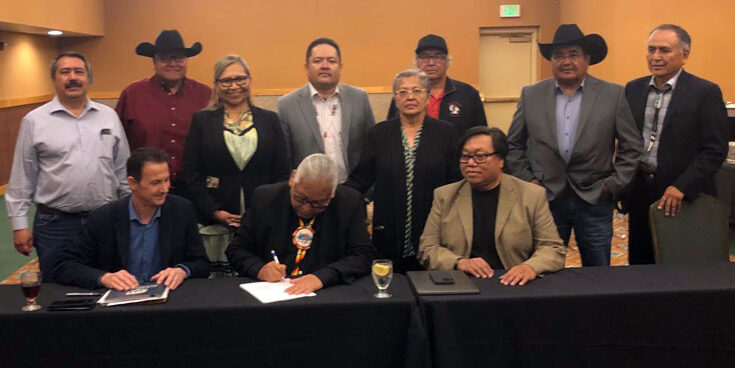Contributed Photo: San Carlos Apache Tribe Chairman Terry Rambler signs a contract with the Bureau of Reclamation for a feasibility study that includes an environmental assessment that will eventually lead to the construction of our Central Arizona Project (CAP) Water Delivery System that will turn the Tribe’s CAP paper water rights into wet water rights that it plans to use to replenish its water aquifers for drinking water, revitalize its cattle industry, and increase agriculture development.
Contributed Article/Courtesy San Carlos Apache Tribe
SAN CARLOS APACHE RESERVATION – The San Carlos Apache Tribe (“Tribe”) announced today the long-delayed signing of a $1.5 million contract between the Tribe and the U.S. Secretary of Interior that initiates studies to deliver Central Arizona Project (CAP) water to the Reservation.
“This is a truly historic day,” San Carlos Apache Tribe Chairman Terry Rambler said. “We have waited 43 years for the federal government to make good on its promise to deliver Central Arizona Project water to our Reservation.”
Under the contract, the U.S. Bureau of Reclamation (BOR) commits to three phases of work to be performed by the Tribe and BOR that will culminate in the completion of an Environmental Impact Statement (EIS). The EIS is necessary for funding the water delivery and distribution system for drinking water, agriculture, and cattle ranching.
The contract first calls for a feasibility study to identify alternatives for delivery of Central Arizona Project water rights from the Black River in Eastern Arizona to the Reservation. The BOR promises to then secure the funding necessary for additional engineering and cost analysis on constructing and operating the water delivery and distribution system and developing a groundwater management plan.
The information from the feasibility and engineering/cost analysis studies will identify water delivery and distribution alternatives for an environmental review as required by the National Environmental Policy Act (NEPA). The BOR has committed to funding the NEPA environmental review, which will identify the preferred alternatives. Once this NEPA process is completed, the BOR would then adopt a Record of Decision, clearing the path for the final design and construction of the project.
The federal government allocated 64,145-acre feet of water annually to the Tribe pursuant to the Tribe’s 1980 CAP Contract and the San Carlos Apache Tribe Water Rights Settlement Act of 1992. (An acre-foot is equal to 325,851 gallons.)
The Tribe estimates that the BOR’s cost share, which is limited to a system capacity of 12,700-acre-feet, will be at least $400 million. Building the project will create about 400 construction jobs. Once completed, the water system will create 200 jobs to operate and maintain the water delivery and distribution system, and the expanded farming and cattle operations that will use the water.
Prior to the completion of the Coolidge Dam on the Gila River in 1928, the Tribe was a leader in breeding Hereford cattle, produced tens of thousands of bushels of corn, wheat, and other foodstuffs, and operated a flour mill.
“The construction of Coolidge Dam flooded our farms, destroying our agricultural economy,” Chairman Rambler said.
In 1980, the Secretary of the Interior promised to deliver water to the Tribe necessary for agriculture and drinking water. After 43 years of delay, the signing of the contract will begin the studies necessary to turn the Tribe’s CAP paper water rights into wet water that can be used by the Tribe.
“We will use this water to replenish our water aquifers for drinking water, revitalize our cattle industry, and increase substantially our agriculture development,” Chairman Rambler said.
“The Tribe also intends to ensure that delivery of the water is just the first step in energizing our economy and educating our people”, Chairman Rambler said.
“Our leadership will work with our college to develop curriculums to teach our children about our water rights history, the cattle industry, agriculture, and the construction and maintenance jobs that will become available for the eventual construction of our CAP water delivery system,” Chairman Rambler said.
“Nearly a century after the federal government destroyed our agriculture economy with (the) construction of the Coolidge Dam followed by more than four decades of delay in signing this contract that will finally return a portion of the water stolen from the Tribe, we are humbled and thankful for this momentous event,” Chairman Rambler said.
“We thank our Creator God for this day, and I ask for his continued blessings for us to complete this project and for the protection of our sacred waters for the benefit of our people and our region,” Chairman Rambler said. “God bless the San Carlos Apache Tribe.”









